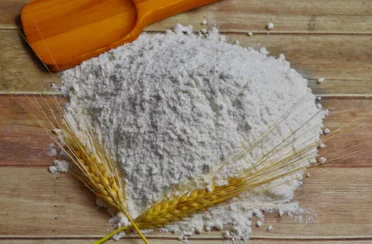Flour is a finely ground powder made from grains, nuts, seeds, or roots. It’s used as a main ingredient in many baked goods, such as bread, cakes, and pastries. Flour can be made from a variety of different grains, including wheat, barley, rye, and corn.
Types of Flour
There are many different types of flour, each with their own unique properties and uses. Here are some of the most common types of flour:
- All-Purpose Flour
All-purpose flour is a blend of hard and soft wheat and is the most commonly used flour in baking. It’s versatile and can be used in a wide range of recipes, from bread and cakes to cookies and pastries.
- Whole Wheat Flour
Whole wheat flour is made from the entire wheat kernel, including the bran and germ. It has a nutty flavor and is higher in fiber and nutrients than all-purpose flour. It’s commonly used in bread and other baked goods that have a denser texture.
- Bread Flour
Bread flour is made from hard wheat and has a higher protein content than all-purpose flour. The extra protein gives bread a chewier texture and helps it rise better. It’s best used for yeast bread and other baked goods that require a lot of rising.
- Cake Flour
Cake flour is made from soft wheat and has a lower protein content than all-purpose flour. It’s finer and lighter than other flours, which gives cakes a tender crumb. It’s best used for delicate baked goods, such as cakes and cupcakes.
- Gluten-Free Flour
Gluten-free flour is made from grains and other ingredients that do not contain gluten, such as rice, corn, and potato starch. It’s used as a substitute for wheat flour for those who have celiac disease or a gluten intolerance.
Vegan-Friendly Alternatives to Flour
For those following a vegan lifestyle, there are several flour alternatives that can be used in baking. Almond flour, for example, is made from ground almonds and can be used in place of wheat flour in many recipes. It has a slightly nutty flavor and is high in protein and healthy fats.
Coconut flour is another vegan-friendly option. It’s made from dried coconut meat and is high in fiber and low in carbohydrates. It has a slightly sweet flavor and can be used in a variety of baked goods.
Cornstarch can also be used as a flour alternative in some recipes. It’s made from corn and is often used as a thickening agent in soups and sauces. It can also be used in place of flour in some baked goods, such as cookies and cakes.
How to Make Sure Flour is Vegan
To ensure that the flour you’re using is vegan, it’s important to read the ingredient label carefully. Look for any additives that may be derived from animal sources, such as L-cysteine or whey protein.
If you’re unsure whether or not a particular flour is vegan, you can contact the manufacturer for more information. Many companies are happy to provide this information to their customers.
It’s also a good idea to look for flour that is certified vegan by a third-party organization, such as the Vegan Society or the Non-GMO Project. This can provide added peace of mind that the flour is free from any animal-derived ingredients or cross-contamination.
Is Flour Vegan?
Now that we know about the different types of flour, the question is whether or not flour is vegan. The answer is not straightforward, as it depends on the type of flour and how it’s processed.
Wheat flour, which is the most common type of flour, is generally considered vegan. It’s made by grinding wheat kernels, which do not contain any animal products. However, some types of wheat flour may contain additives, such as enzymes or conditioners, that are derived from animal sources. These additives are used to improve the texture or shelf life of the flour.
Bread flour, for example, may contain dough conditioners that are derived from animal sources, such as L-cysteine, which is often made from duck feathers. Cake flour may also contain whey protein, which is a byproduct of cheese production.
It’s important to read the ingredient label carefully when purchasing flour to ensure that it’s vegan-friendly. If you’re unsure whether or not a particular flour is vegan, you can contact the manufacturer for more information.
Gluten-free flour, on the other hand, is generally considered vegan. It’s made from grains and other ingredients that do not contain animal products. However, some gluten-free flours may be processed in facilities that also process animal products, which could lead to cross-contamination.
Conclusion
In conclusion, the answer to whether or not flour is vegan depends on the type of flour and how it’s processed. Most wheat flour is vegan, but some types may contain additives that are derived from animal sources. Gluten-free flour is generally considered vegan

